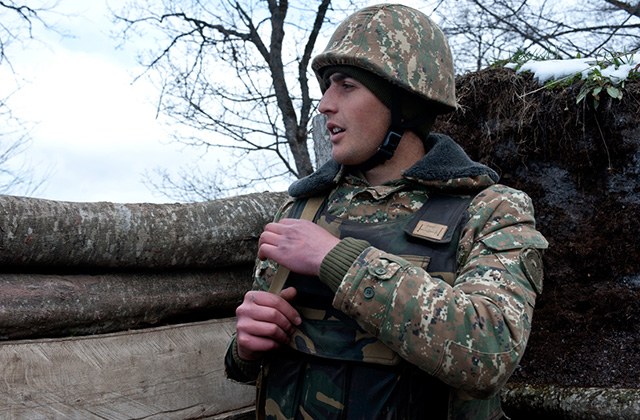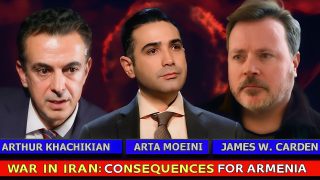In Search of the “Modest Hero”

On our way to Karabakh, we learned that an Azerbaijani military helicopter had been shot down on April 2nd.
It is easier for print journalists – dry official information is enough to complete a newspaper page.
For a photographer it is more complicated. One cannot take pictures from the comfort of a hotel. A photographer should be on the scene.
It turned out to be not so easy to get to the “crocodile” crash site. We had to go through Mataghis village, which was under intensive bombardment. The enemy artillery was paying special attention to the road we had to take.
One day earlier on the same road, we traveled by police car, an UAZ, from Talish to Martakert. We were lucky – our UAZ, rushing at high speed, was only splashed by water from a puddle where a shell had landed. The shell fragments flew away on the opposite side of the road.
This time it was necessary to tempt fate for a second time, driving an old German Opel.
Having accelerated to the maximum possible speed that a 25-year old Opel Kadett can manage, I happened to notice out of the corner of my eye new shell potholes in the road, which had not been there the day before. While racing at breakneck speed through the village, somehow the memory came to me of the cameras in Yerevan that monitor traffic violations.
Then we continued our way quietly. At least that is how it seemed. Because later we learned from the division duty officer that after we left the post, where we had stopped to have a smoke with some soldiers, the place was bombed by a Grad rocket launcher.
We left the Opel at the division and drove in an “Ural” to the front with the young soldiers. It took a long time to get there. Every time the “Ural” stopped, I sighed with relief. We stopped many times. After the fifth or sixth stop, I ceased counting, and just sighed. We spent the night with the soldiers in the mountains. Then the entire morning we were sitting and waiting for the bombardments out on the road to end. Having a tedious time in the division yard, suddenly I heard somebody call out to me: “Uncle German!”. Only one man called me this, back in the days when I taught photojournalism at the Slavonic University. There was no mistaking him – I turned around and saw…my former student. “Suren!!!”. I could not speak anymore, a lump stuck in my throat.
Surik repeatedly received reprimands from the head of the department for addressing me in this way, during a lecture .At the University they had some special rules, but I asked Surik to call me not “Paron Avagyan” (Mr Avagyan), but “Ynker German” (Comrade German). Nothing helped – “Uncle German,” sometimes “Uncle Gera” pursued me the whole term. We hugged. “So, Suren, today we may finish our training. Now you understand what photojournalism is. Better than any of our students”.
When he learned that I came to Karabakh lightly packed, or rather not at all – having not even brought a spare pair of socks – my student rushed to the barracks for underclothes and cigarettes. I barely managed to dissuade him from this idea: “Surik jan, I’ll go, you stay. This is me, I am the one who should bring you cigarettes, not you me. I’d rather not smoke a day or two.”
We took a photograph together for memory’s sake. I hope he will invite me to photograph his wedding. I promise I will not take money for this.
At about 1 p.m. the commander gave us permission to go further: a cease-fire had been declared.
After passing a couple of kilometers, we were stopped by soldiers who warned us that the enemy “Shilka” was “working” on the road ahead. The officer who accompanied us swore: “Didn’t they, bastards, receive the order to hold their fire?!”
After a while we were allowed to proceed further. Finally we got to the place where our hero served. We went through the trench and saw him at his post. But it turned out that it was easier to get to the hero than to conduct an interview with him. This humble village boy was a man of few words. Here is everything that was possible to pull out of him:
“Gevorg Manukyan, from the Khromon village”.
So, tell us, how did it happen?
“I stood and watched. I saw a helicopter approaching our positions, firing. I took up this weapon…”
What is it called, this weapon?
“It’s a military secret,” the boy cut me off, short.
What Gevorg did not say was that he was knocked out by the helicopter. In the end, after my inquiries, he replied: “I do not know. I’m not good at remembering the names of weapons.”
Having photographed our hero, I promised Gevorg to bring the photos to Khromon village on July 17th, on the day his military service ends.
Then there was the road back. At night, in the back of a Kamaz. Once we reached our Opel, we drove it the rest of the way to Stepanakert. Fortunately, the ceasefire was in force. Otherwise, driving in the dark with night lights on would have been tantamount to suicide.
By Herman Avagyan












































